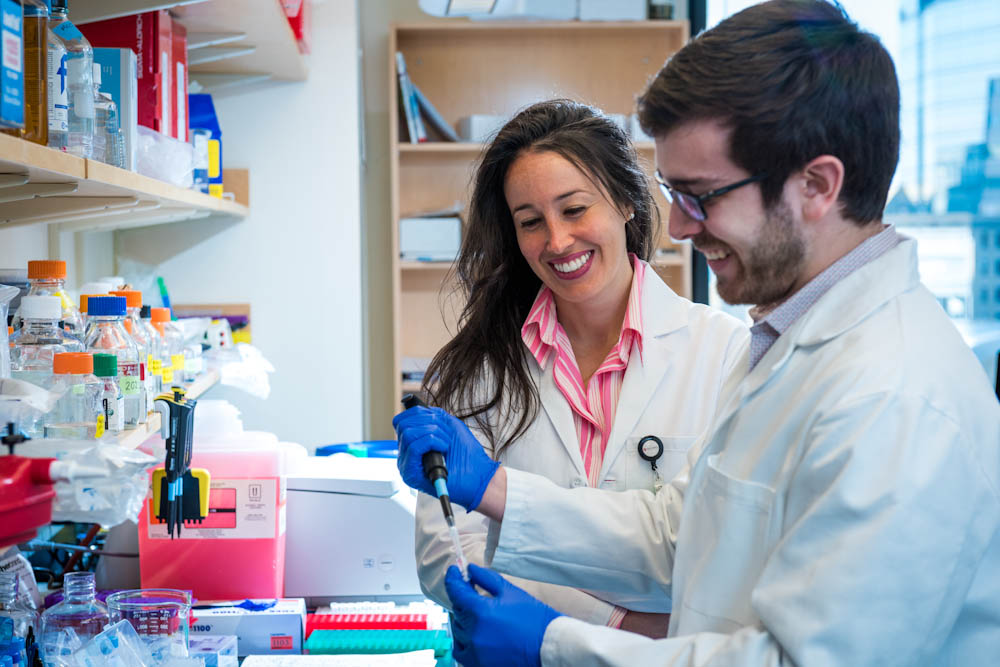Growing up in the San Francisco area, Cigall Kadoch, PhD, had a passion for puzzles. The daughter of a Moroccan-born, Israeli-raised father and a mother from Michigan who together developed an interior design business, Kadoch excelled in school and pretty much everything else. Above all, she loved to solve brain-teasers.

In high school, however, Kadoch came up against a problem that defied solution. Breast cancer took the life of a beloved family caretaker who had nurtured her interests in science and nature.
“I was deeply saddened and very frustrated at my lack of understanding of what had happened,” recalls Kadoch, now a cancer researcher at Harvard Medical School (HMS) and Dana-Farber/Boston Children’s Cancer and Blood Disorders Center.
At the time, she knew little about cancer except that it took lives far too early. “I thought to myself, cancer is a puzzle that isn’t solved, let alone even well-defined, and I want to try. As naïve a statement as that was, it was a defining moment – one which I never could have predicted would actually shape my life’s efforts.”
Kadoch blazed through college, taking pre-med courses, but she chose cancer biology for graduate study at Stanford University. “I couldn’t drop this quest to solve puzzles and a chance to contribute new knowledge to the book of medicine,” she explains. Dana-Farber Chief of Staff Stephen Sallan, MD, describes Kadoch as “addicted to discovery.”
Working in the lab of prominent Stanford biologist Gerald Crabtree, MD, she authored two cancer research papers. The first, in the high-profile journal Cell, reported her discovery of how a gene mutation in a “chromatin-remodeling complex” leads to a rare, hard-to-treat cancer called synovial sarcoma. Its fundamental cause had been unknown. Remarkably, she and Crabtree were the only authors of the paper: an impressive achievement for someone so junior.
The second publication, in Nature Genetics, reported for the first time that defects in these chromatin-remodeling complexes – specifically in structure called the BAF complex – drive at least 20 percent of all human cancers. “The surprising thing we learned from recent sequencing studies is that these chromatin complexes play a significant role in cancer,” Kadoch says.
With these insights, Kadoch broke new ground in the hot research area of cancer epigenetics — processes that change how genes operate without altering the genes themselves.
“If we can understand how the flawed architecture of the chromatin complex can cause cancer, we can hopefully design specific therapeutic strategies,” Kadoch explains. She and her team are using biochemical tools to reverse-engineer the structural makeup of the complexes.
“At this point we don’t know how the puzzle pieces fit together in the complexes. We’re asking how they are assembled in the first place. How do mutations affecting the complexes change which genes they go to and activate across the genome?”
Hitting the Ground Running
In 2013, after earning her PhD in less than three years, Kadoch vaulted into a position in Dana-Farber/Boston Children’s department of Pediatric Oncology, and is an assistant professor at HMS. Then 27, she was one of the youngest scientists ever appointed to the HMS faculty. She is also a member of the Broad Institute of Harvard and MIT.
George Demetri, MD, Dana-Farber’s senior vice president for experimental therapeutics, played a major role in recruiting her. “Cigall came to Boston and gave a talk at the Broad Institute about her research. One of our investigators — James Bradner, MD — came back and said, ‘We’ve got to get her here.'”

Applying for “everything under the sun,” she has funded her lab thus far through awards and grants, along with philanthropic gifts from donors who have heard her explain her research and its potential for fighting cancer in new ways.
In 2014, she received a $2.5 million innovator award from the National Institutes of Health and a $1 million American Cancer Society Research Scholar Award. Around the same time, she was named to Forbes magazine’s list of “30 under 30” – the top people under age 30 who are making an impact on the world.
Many targeted drugs block the activity of cancer-causing oncogenes. But it is notoriously difficult to treat cancer by restoring broken tumor suppressor proteins – like the BAF chromatin-regulatory complex that malfunctions to trigger synovial sarcoma and other cancers.
Kadoch remains undaunted. Even if this particular strategy does not apply to other cancers caused by broken chromatin complexes, she believes that understanding how the faulty complexes trigger rare cancers will pay off in discovering the causes of more common cancers.
And that’s a puzzle Kadoch is determined to solve.
This article originally appeared in Dana-Farber’s Spring/Summer 2015 issue of Paths of Progress.

Great story on Cigall, thanks for sharing.